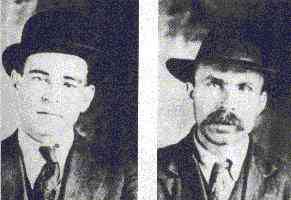TWO GOOD MEN
(WOODY GUTHRIE) (1945-'46)

HISTORICAL BACKGROUND | SONG LYRICS




To order available recordings right from this site:
CDnow's Country/Folk section!

On May 12, 1926, the Supreme Court of Massachusetts found 'no error' in any of the rulings of Judge Thayer. The guilt or innocence of the defendants was not retried in the Supreme Court. That court could not inquire whether the facts as set forth in the printed record justified the verdict. Such would have been the scope of judicial review had the case come before the New York Court of Appeals or the English Court of Criminal Appeal. In those jurisdictions a judgment upon the facts as well as upon the law is open, and their courts decide whether convictions should stand in view of the whole record. A much more limited scope in reviewing connections prevails in Massachusetts. What is reviewed in effect is the conduct of the trial judge; only so called questions of law are open.The merits of the legal questions raised by the exceptions cannot be discussed here. Suffice it to say, with deference, that some of the Supreme Court rulings are puzzling in the extreme. One question of law, however, can be explained within small compass, and that is the question which is the crux of the case: Did Judge Thayer observe the standards of Anglo-American justice? In legal parlance, was there abuse of "judicial discretion" by Judge Thayer? What, then, is "judicial discretion"? Is it a legal abracadabra, or does it imply standards of conduct within the comprehension of the laity in whose interests they are enforced? The present Chief Justice of Massachusetts has given an authoritative definition:
"Discretion in this connection means a sound judicial discretion, enlighted by intelligence and learning, controlled by sound principles of law. Of firm courage combined with the calmness of a cool mind, free from partiality, not swayed by sympathy nor warped by prejudice nor moved by any kind of influence save alone the overwhelming passion to do that which is just. It may be assumed that conduct manifesting abuse of judicial discretion will be reviewed and some relief afforded."This is the test by which Judge Thayer's conduct must be measured. The Supreme Court found no abuse of judicial discretion on the record presented at the first hearing before it. In other words, the Court was satisfied that throughout the conduct of the trial and the proceedings that followed it Judge Thayer was governed by "the calmness of a cool mind, free from partiality, not swayed by sympathy nor warped by prejudice nor moved by any kind of influence save alone the overwhelming passion to do that which is just."Felix Frankfurter, The Case of Sacco and Vanzetti, Atlantic Monthly, March 1927.



Say, there, did you hear the news?
Sacco worked at trimmin' shoes;
Vanzetti was a peddlin' man,
Pushed his fish cart with his hand.Two good men a long time gone,Sacco's born across the sea,
Two good men a long time gone,
Sacco an' Vanzetti are gone,
[ALTERNATE: Two good men a long time gone] Left me here to sing this song.
Somewhere over in Italy;
Vanzetti born of parents fine,
Drank the best Italian wine.Sacco sailed the sea one day,
Landed up in the Boston Bay.
Vanzetti sailed the ocean blue,
An' landed up in Boston, too.Sacco's wife three children had;
Sacco was a family man.
Vanzetti was a dreamin' man,
His book was always in his hands.Sacco earned his bread and butter
Bein' the factory's best shoe cutter.
Vanzetti spoke both day and night,
Told the workers how to fight.I'll tell you if you ask me
'Bout this payroll robbery.
Two clerks was killed by the shoe fact'ry,
On the streets in South Braintree.Judge Thayer told his friends around
That he had cut the radicals down.
"Anarchist bastard" was the name
Judge Thayer called these two good men.I'll tell you the prosecutor's name,
Katzman, Adams, Williams, Kane.
The Judge and lawyers strutted down,
They done more tricks than circus clowns.Vanzetti docked in nineteen eight;
Slept along the dirty street,
Told the workers "Organize,"
And on the 'lectric chair he dies.All you people ought to be like me,
And work like Sacco and Vanzetti,
And everyday find ways to fight
On the union side for the workers' rights.Well, I ain't got time to tell this tale,
The dicks and bulls are on my trail.
But I'll remember these two good men
That died to show me how to live.All you people in Suassos Lane,
Sing this song and sing it plain.
All you folks that's comin' along,
Jump in with me and sing this song.

This page hosted by ![]() Get your own Free Home Page
Get your own Free Home Page